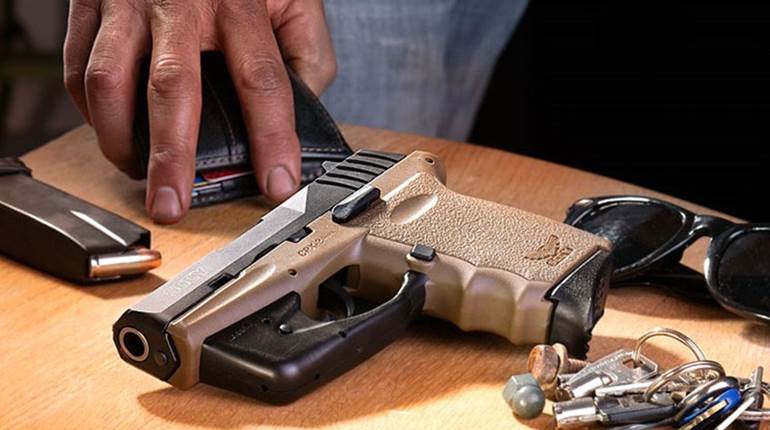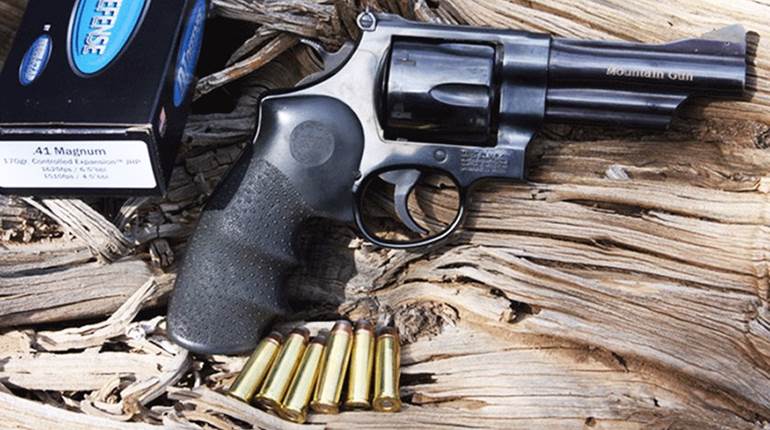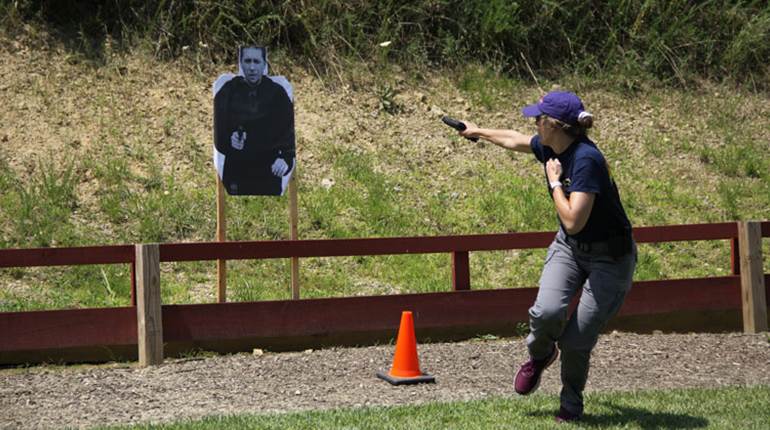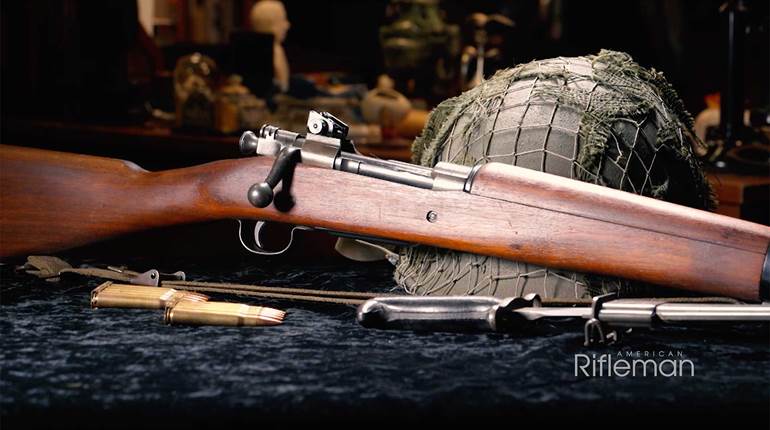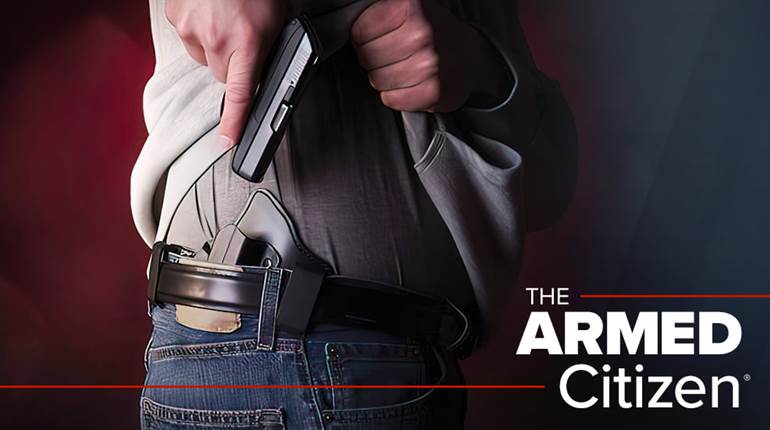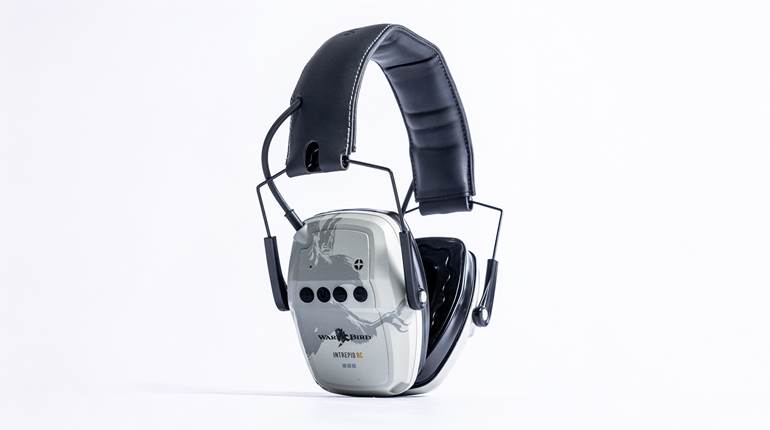
2/20/2013
Ruger scored a hit in 1992 when it paired its classic semi-automatic .22 Long Rifle rimfire pistol design with a fiberglass-reinforced nylon grip frame whose shape and angle approximated that of the M1911. Since then the appropriately designated 22/45’s grip frame has been subtly reshaped, and the Mark III 22/45 line has grown to include several models—the latest of which is the 22/45 Lite. As its name suggests, it is the lightest to date, weighing 22.8 ounces with an empty magazine in place. That makes it more than a half-pound lighter than other 22/45 models, which range from 31 to 33 ounces.
The weight reduction is mostly the result of a gold-tone-anodized cylindrical aluminum receiver that measures 1 inch in outer diameter and fully shrouds the steel inner barrel, thus preserving the gun’s classic bull-barrel profile. The barrel measures nearly 3/4 inches in diameter at the chamber but soon after reduces to little more than 5/16 inches out to the muzzle. There a factory-installed, non-removable nut tensions the barrel against the receiver. In addition, the barrel is fitted with a knurled, finger-tight, black aluminum cap that protects 1/2-inch x 28 muzzle threads designed to accommodate a sound suppressor.
The 22/45 Lite’s Zytel frame, unlike earlier pistols in the 22/45 line, features metal bushings that allow for the attachment of the stock panels by way of two screws each. Rubber stocks are included and wood stocks are available. Controls present on the left side of the frame include: an M1911-style magazine release button; an extended, swinging manual bolt catch/release button just forward of the top corner of the stock panel; a manual safety at the top of the backstrap and, just below that, a recessed keyway to an internal lock for which two keys are included. The pistol also features an internal magazine disconnect safety, rendering it unable to fire when the magazine is removed. The grip features a panel of fine horizontal serrations on its frontstrap and checkering on the backstrap. Molded reliefs at the rear of the trigger guard mimic those of the M1911A1 and ease access to the wide, serrated trigger bow.
A series of five angled grooves on each side of the receiver’s front and three on each side of its rear resemble cocking serrations but serve only to further reduce the gun’s overall weight. A loaded-chamber indicator lies along the centerline of the receiver’s left side above the trigger guard and pivots outward at its rear, revealing a small red bar and the word “LOADED,” when a cartridge case is present.
Sights consist of a fully adjustable, aluminum and steel square-notch rear unit dovetailed into the receiver and fixed with a set screw, and a one-piece steel ramped front unit secured with a single screw. The pair are high enough to allow sighting over typical rimfire suppressors. Three filler screws in the top center of the receiver, two ahead of the ejection port and one behind it, mark the location of drilled and tapped holes that allow mounting of the included black anodized aluminum optic rail, which accepts both Weaver and 3/8-inch rings.
The 22/45 Lite is a simple blowback-operated design in which the cylindrical steel bolt reciprocates within the rear portion of the receiver, recocking the hammer with each cycle. The beefy hook extractor, located at 9 o’clock on the bolt face, and an equally sturdy ejector, located at 5 o’clock, work in concert with a stout recoil spring assembly that rides on a fixed metal rod at the 12 o’clock position to ensure the pistol’s consistent cycle of operation. The Lite is charged by grasping and pulling back the ears on either side of the bolt’s rear. At rest they lie behind relief cuts on the receiver in recesses corresponding to their serrated, inwardly tapering profile. The cuts facilitate grasping by the thumb and forefinger of the supporting hand from above when the pistol is held in the firing hand. The bolt must not be ridden home when releasing it, however, as doing so could not only induce a failure to chamber a round but would likely pinch the hand in the recesses. Once a magazine has been expended, the serrated, round metal button on the follower’s left side automatically activates the bolt catch, locking the bolt to the rear.
While well proven through more than 60 years of use, the Ruger’s design nonetheless has one vexing trait, and that is its reassembly procedure. Rather than repeat it here, suffice it to say that it demands the user’s close attention to steps outlined in the owner’s manual and several practice runs before it becomes second-nature. In addition, be forewarned that the 22/45 Mark III series, including the Lite, requires additional steps to complete the procedure.
For accuracy testing, we used the iron sights with a variety loads of differing velocities. We did note some malfunctions—failures to extract—with the tested subsonic load when a suppressor, with its attendant backpressure, was not installed. In addition, occasional feeding malfunctions with the high-velocity load were attributed to slightly distorted feed lips on one of the two supplied magazines. Otherwise there were no malfunctions during the course of shooting several hundred rounds of ammunition. Some shooters complained that the gun’s sights were somewhat coarse, but they were easy to acquire and offered a well-defined sight picture. Accuracy was on-par with other Ruger pistols we have tested in the past that had heavier and/or longer barrels, indicating that the Lite’s tensioned barrel arrangement is effective. Further, although there were often individual fliers within a group, no pronounced stringing of shots was observed, indicating that the Lite’s receiver likely serves as a heat sink for its small-diameter barrel.
The Ruger 22/45 Lite’s reliability, accuracy, reasonable price and light weight make it equally desirable as a survival pistol, trainer, plinker and small-game gun—especially for backpackers, pilots and others concerned with paring ounces—and confirm that Ruger has yet another hit on its hands.
Manufacturer: Sturm, Ruger & Co., Inc.; (603) 865-2442; www.ruger.com
Caliber: .22 Long Rifle
Action Type: blowback-operated semi-automatic rimfire pistol
Receiver: gold anodizedaircraft-grade aluminum
Barrel: 43⁄8" tensioned steel: 1/2"-28 threaded muzzle and included knurled aluminum thread protector
Rifling: six-groove, 1:16" RH twist
Magazine: 10-round detachable steel box
Sights: fully adjustable dovetailed rear; screw-secured black blade front; receiver drilled and tapped for included black aluminum combination Weaver/3/8" optic rail
Trigger: 3/8"-wide serrated aluminum bow; 5-lb., 2-oz. pull
Grip Frame: glass-filled nylon
Length: 87⁄16"
Height: 51⁄2"
Width: 13⁄32"
Weight: 22.8 ozs. with empty magazine inserted
Accessories: black nylon zippered rug, spare magazine, lock, owner’s manual
Suggested Retail Price: $469













